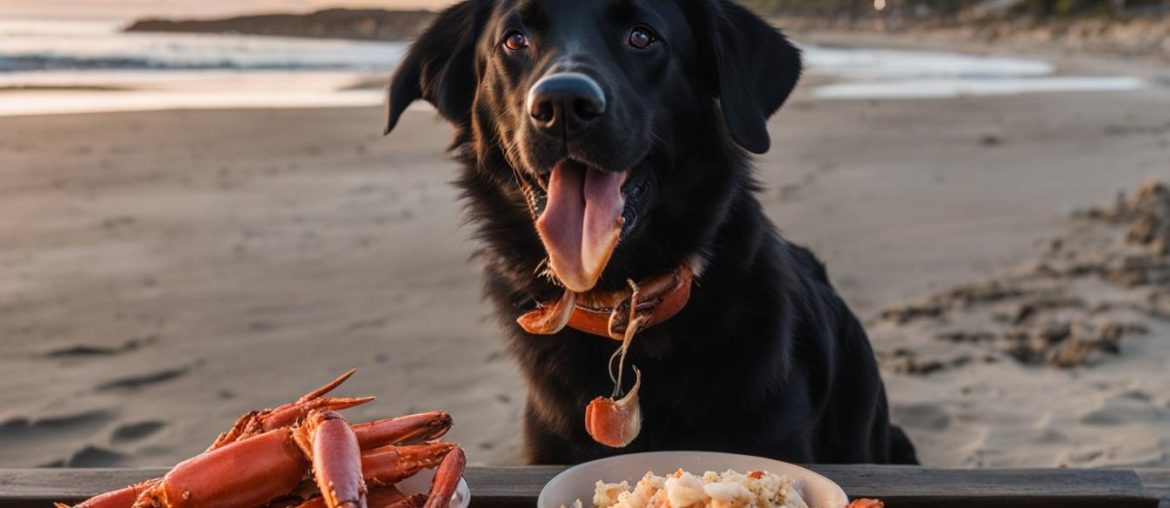I am here to provide a comprehensive guide for pet owners who are curious about whether or not dogs can safely consume crab. As a pet owner myself, I understand the importance of ensuring our furry friends have a balanced and appropriate diet. In this article, I will address the health benefits of crab for dogs, the risks associated with feeding dogs crab, and provide valuable insights on how to safely incorporate crab into your dog’s diet.
Key Takeaways:
- Crab meat can be safely consumed by dogs in small amounts and can provide them with lean protein and essential nutrients.
- Precautions should be taken to avoid feeding dogs raw crab, crab shells, and seasoned crab.
- Monitor your dog’s response to crab and consult with a veterinarian if you have any concerns or questions.
- Dogs should not be given crab legs as they can pose a choking hazard and cause injuries.
- It is best to introduce crab meat to dogs gradually and monitor for any signs of allergies or stomach upset.
Is Crab Meat Safe for Dogs?
Crab meat is generally considered safe for dogs to consume when cooked and prepared properly. It can be a good source of lean protein and essential nutrients for your furry friend. However, there are some important considerations to keep in mind when feeding crab meat to dogs.
Firstly, it is crucial to remove the shell and any seasoning or butter from the crab meat before offering it to your dog. The shells can pose a choking hazard and cause injuries to their mouth, throat, or digestive tract. Seasonings and added fats can also be harmful to dogs and may cause digestive upset.
Secondly, raw crab should never be given to dogs. Raw seafood, including crab, can potentially contain parasites and bacteria that may cause gastrointestinal issues in dogs. It is always best to cook the crab thoroughly to eliminate any potential health risks.
Lastly, it is important to introduce crab meat to your dog’s diet gradually and in small amounts. This allows you to monitor their response for any signs of allergies or stomach upset. If your dog shows any adverse reactions to crab meat, such as vomiting, diarrhea, or excessive itching, it’s important to consult with a veterinarian.
| Pros | Cons |
|---|---|
| Good source of lean protein | Potential allergy or adverse reactions |
| Contains essential nutrients like vitamin B12 and omega-3 fatty acids | Choking hazard from shells |
| Can be a tasty and nutritious addition to a dog’s diet in moderation | Raw crab can contain parasites and bacteria |
Remember, every dog is unique, and what works for one may not work for another. Always consult with your veterinarian before making any significant changes to your dog’s diet or introducing new foods, including crab meat.
Health Benefits of Crab for Dogs
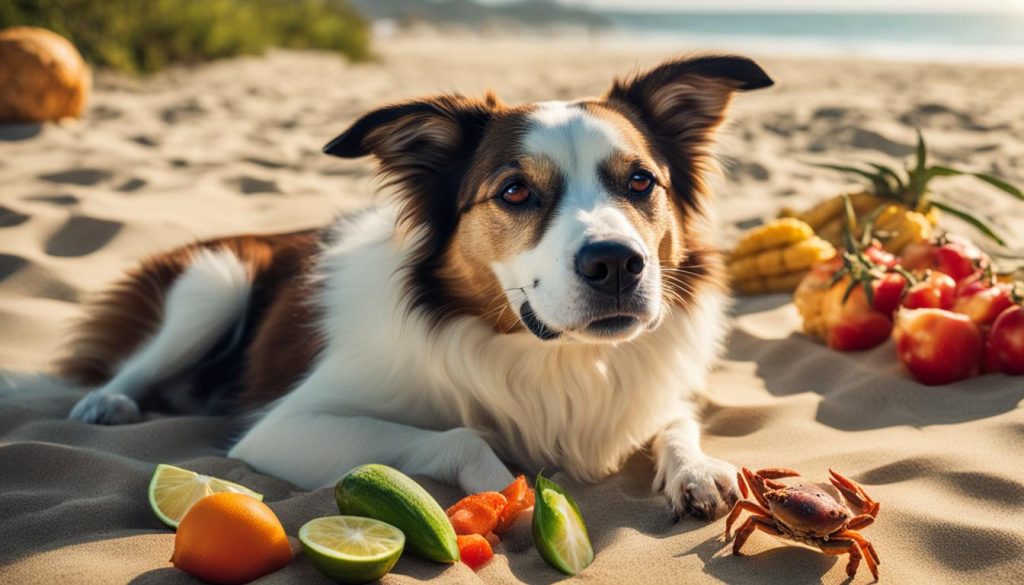
Crab meat can provide several health benefits for dogs. It is a good source of lean protein, essential amino acids, and omega-3 fatty acids. The protein in crab meat helps support muscle development and repair, while the omega-3 fatty acids promote a healthy immune system and kidney function. Additionally, crab meat contains vitamins and minerals that contribute to overall well-being.
Below is a breakdown of the key health benefits that crab meat can offer to dogs:
- Lean Protein: Crab meat is rich in lean protein, which is essential for tissue repair and growth. Protein is a vital component of a dog’s diet, supporting strong muscles and maintaining a healthy weight.
- Omega-3 Fatty Acids: Crab meat contains omega-3 fatty acids, which have anti-inflammatory properties and can benefit a dog’s skin and coat health. These fatty acids also support brain function and help maintain a healthy heart.
- Vitamins and Minerals: Crab meat is a good source of vitamins and minerals such as vitamin B12, vitamin C, zinc, and copper. These nutrients contribute to a dog’s overall well-being and help support various bodily functions.
It is important to note that while crab meat can offer health benefits, it should be introduced to dogs in moderation. As with any new food, it is recommended to monitor your dog’s response and consult with a veterinarian before incorporating crab into their diet.
Risks of Feeding Dogs Crab

Feeding dogs crab can have its risks and it is important for pet owners to be aware of these potential dangers. One of the main concerns is the possibility of allergic reactions. Just like humans, dogs can develop allergies to certain foods, including shellfish like crab. It is essential to closely monitor your dog after they consume crab for the first time and watch out for any signs of an allergic reaction such as itching, swelling, or difficulty breathing.
Another risk associated with feeding dogs crab is the potential for shell fragments. Dogs may accidentally ingest pieces of crab shells, which can pose a choking hazard or lead to blockages in their digestive system. To prevent this, always ensure that the crab meat is thoroughly cleaned and free from any shell remnants before giving it to your dog.
It is important to note that not all dogs will have the same reactions to crab consumption. Some may tolerate it well, while others may experience adverse effects. Always consult with your veterinarian before introducing crab or any new food into your dog’s diet.
Additionally, certain preparations of crab should be avoided when feeding dogs. Seasoned or deep-fried crab, for example, can be high in salt and unhealthy fats, which can lead to health issues such as high blood pressure or pancreatitis in dogs. Stick to plain, freshly cooked crab meat without any added seasonings or spices to ensure the safety and well-being of your furry friend.
Allergies:
- Monitor for signs of allergic reactions such as itching, swelling, or difficulty breathing
- Consult with a veterinarian if you suspect your dog may have an allergy to crab
Shell Fragments:
- Ensure that the crab meat is thoroughly cleaned and free from any shell remnants
- Prevent the ingestion of shell fragments, which can pose a choking hazard or cause blockages in the digestive system
Preparation of Crab:
- Avoid seasoned or deep-fried crab, as it can be high in salt and unhealthy fats
- Stick to plain, freshly cooked crab meat without any added seasonings or spices
By being aware of these risks and taking the necessary precautions, you can safely incorporate crab into your dog’s diet and provide them with a tasty and nutritious treat. Remember to always prioritize the well-being and health of your furry companion.
Can Dogs Eat Crab Legs?
Crab legs are a popular seafood delicacy, but can dogs enjoy them too? While dogs can eat crab legs, there are certain precautions to take to ensure their safety. It is important to note that the sharp edges of the crab shells can cause injuries to a dog’s mouth and digestive tract. Therefore, it is essential to remove the shells before offering crab legs to your furry friend.
When serving crab legs to dogs, it is best to offer them in small portions as an occasional treat rather than as a regular part of their diet. This helps to prevent any potential digestive issues that may arise from consuming too much seafood. Additionally, make sure the crab legs are fully cooked, as raw or undercooked seafood can carry parasites and pose health risks to dogs.
Remember, moderation is key when it comes to feeding dogs crab legs. Always monitor your dog’s response and consult with your veterinarian if you have any concerns or if your dog has any underlying health conditions.
Below is a table summarizing the information about feeding crab legs to dogs:
| Can Dogs Eat Crab Legs? | Precautions |
|---|---|
| Yes, dogs can eat crab legs. | – Remove the shells before feeding. – Offer in small portions as an occasional treat. – Ensure the crab legs are fully cooked. |
Feeding your dog crab legs should always be done with caution and in moderation. It is also important to consider any allergies or sensitivities your dog may have to seafood. If you notice any adverse reactions such as vomiting, diarrhea, or difficulty breathing after feeding crab legs, discontinue the practice and consult your veterinarian for further guidance.
Types of Crabs and Dogs
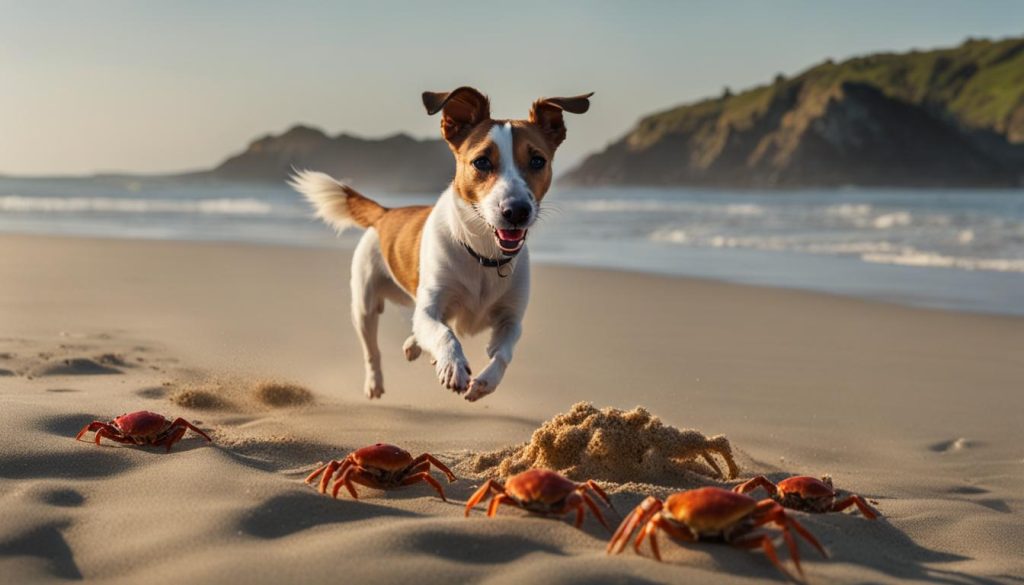
When it comes to feeding your dog crab, it’s important to consider the different types of crabs available and their suitability for your furry friend. While dogs can generally consume various types of crabs, it’s crucial to ensure that your dog is not allergic to shellfish before introducing it into their diet.
Here are some types of crabs that can be safe for dogs to eat:
- Blue Crab
- Ghost Crab
- King Crab
- Snow Crab
These crabs can provide a delicious treat for your dog, as long as the crab meat is fully cooked and free from any seasonings or shell fragments. Remember to introduce crab meat to your dog in moderation and monitor their reactions to ensure they do not experience any adverse effects.
“Feeding your dog crab can be a delightful experience, but it’s important to pay attention to their individual preferences and tolerances. Each dog may have different reactions to crab meat, so it’s crucial to observe their response and consult a veterinarian if needed,” says Dr. Smith, a renowned veterinarian.
| Crab Type | Suitability for Dogs |
|---|---|
| Blue Crab | Safe for dogs if not allergic to shellfish |
| Ghost Crab | Safe for dogs if not allergic to shellfish |
| King Crab | Safe for dogs if not allergic to shellfish |
| Snow Crab | Safe for dogs if not allergic to shellfish |
Remember, always prioritize your dog’s safety and well-being when introducing new foods into their diet, including crab meat. To ensure their health, it’s best to consult with a veterinarian for personalized advice based on your dog’s specific needs and dietary requirements.
Can Dogs Eat Fresh Crabs on the Beach?
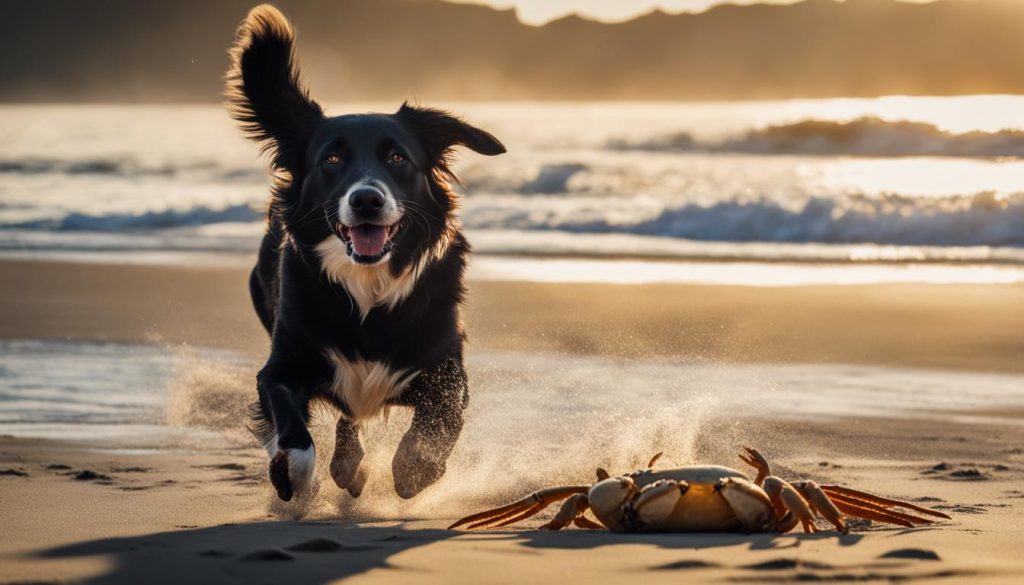
Dogs should not be allowed to eat fresh crabs found on the beach. While it may be tempting to let your furry friend indulge in this natural seafood find, it can pose several risks to their health. The shells of crabs can be sharp and easily cause choking or injuries to their mouth, throat, or digestive tract. Additionally, crabs found on the beach may harbor parasites or bacteria that can make your dog sick.
It’s important to remember that the safety and well-being of your dog should always come first. Instead of allowing them to eat fresh crabs on the beach, it’s best to prevent access to these potential hazards. Keep a close eye on your dog while enjoying beach outings and promptly discourage them from investigating or consuming any crabs they may come across.
| Can Dogs Eat Fresh Crabs on the Beach? | |
|---|---|
| Risks | – Sharp crab shells can cause choking or injuries – Crabs may carry parasites or bacteria that can make dogs sick |
| Recommended Action | Prevent dogs from accessing crabs on the beach Discourage them from eating or investigating crabs |
Remember, if you want to introduce crab into your dog’s diet, it’s best to offer them properly cooked and prepared crab meat in controlled portions. Consult with your veterinarian to ensure it is safe and suitable for your dog, taking into consideration any allergies or health issues they may have.
In summary, while the idea of dogs enjoying fresh crabs on the beach may seem appealing, it is not recommended due to the potential risks involved. It’s essential to prioritize your dog’s safety and well-being by preventing them from accessing and consuming crabs found in their natural environment. Instead, opt for feeding them properly cooked and prepared crab meat in consultation with your veterinarian.
Can Dogs Eat Crab Shells?
Dogs should not be allowed to eat crab shells as they can cause injuries to their mouth, throat, and digestive tract. Crab shells are sharp and can lead to cuts or blockages if ingested. It is important to ensure that dogs only consume the meat of the crab without any shells.
If a dog were to consume crab shells, it could result in a variety of health issues. The sharp edges of the shells can cause cuts or punctures in the mouth, tongue, or throat, leading to pain and potential infection. Additionally, if the shells are swallowed, they can cause blockages in the digestive tract, which may require surgical intervention to remove.
Therefore, it is essential to prevent dogs from accessing crab shells and to dispose of them properly to ensure your pet’s safety. If you notice any signs of discomfort, such as drooling, difficulty swallowing, vomiting, or diarrhea after your dog has potentially ingested crab shells, it is crucial to seek immediate veterinary attention.
Table: Risks of Feeding Dogs Crab Shells
| Risks | Consequences |
|---|---|
| Injuries to the mouth, throat, and digestive tract | Pain, infection, potential surgical intervention |
| Blockages in the digestive tract | Obstruction, potential surgical intervention |
It is always best to prioritize your dog’s health and well-being by providing them with safe and appropriate food options. Stick to feeding them the meat of the crab without any shells to avoid any potential risks and ensure their digestive system remains healthy. If you have any concerns or questions about your dog’s diet, it is recommended to consult with a veterinarian for professional advice tailored to your pet’s specific needs.
Can Dogs Eat Crab Eggs?
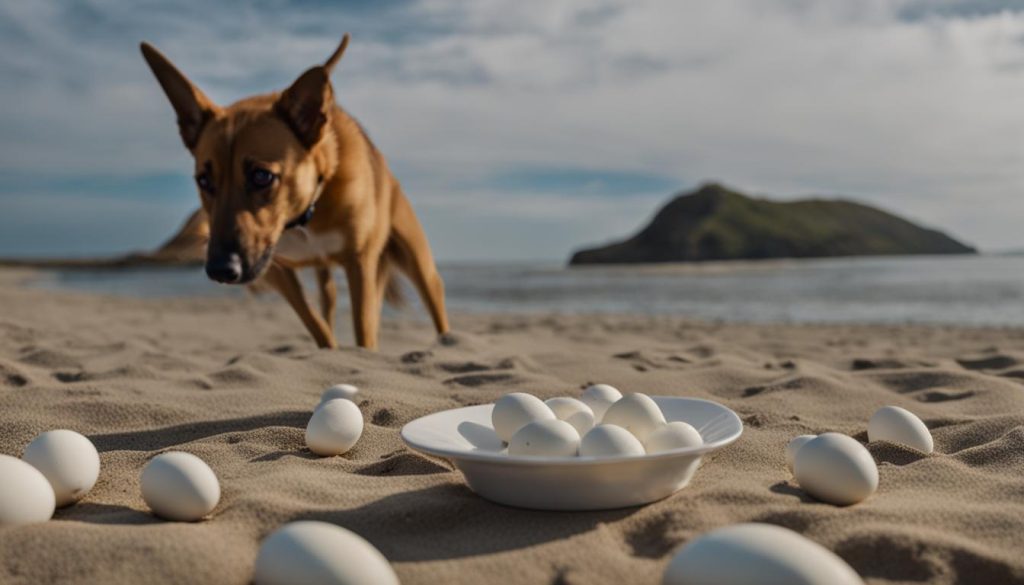
When it comes to crab eggs, it is not recommended for dogs to consume them. Crab eggs, also known as roe, can be high in sodium, which can be harmful to dogs if ingested in large amounts. While a small taste of crab eggs may not pose an immediate danger, it is best to err on the side of caution and avoid giving them to dogs altogether.
Crab eggs are a delicacy for humans, but they are not a necessary part of a dog’s diet. Dogs have different nutritional needs than humans, and their bodies may not process certain foods as efficiently. It is always important to prioritize a dog’s overall health and well-being by providing them with a balanced and appropriate diet.
If you are unsure about what foods are safe for your dog to eat, it is best to consult with a veterinarian. They can provide personalized guidance based on your dog’s specific needs and dietary restrictions. Remember that the health and safety of your furry friend should always come first.
The Risks of Crab Eggs for Dogs:
- Sodium Content: Crab eggs can be high in sodium, which can lead to sodium poisoning or exacerbate existing health conditions in dogs.
- Nutritional Imbalance: Dogs require a balanced diet that includes specific nutrients. Crab eggs do not provide essential nutrients in optimal quantities for dogs.
- Potential Allergies: Some dogs may be allergic to shellfish, including crab eggs. Introducing new foods with potential allergens should be done with caution.
To summarize, it is best to avoid feeding crab eggs to dogs. While a small taste may not cause immediate harm, the risks associated with crab eggs outweigh any potential benefits. Stick to feeding your dog a balanced and appropriate diet tailored to their specific needs for optimal health and happiness.
Can Dogs Eat Imitation Crab?
Many pet owners wonder whether their dogs can safely consume imitation crab. Imitation crab is a popular seafood substitute made from white fish, such as pollock, and it is commonly used in dishes like sushi rolls and seafood salads. However, it is not recommended to feed dogs imitation crab on a regular basis.
Imitation crab often contains additives, artificial ingredients, and high levels of sodium, which can be harmful to dogs. While small amounts of imitation crab may not cause immediate harm, it is not a nutritious or recommended treat for them. As responsible pet owners, it is best to prioritize feeding our dogs a balanced and healthy diet that meets their specific nutritional needs.
If you are looking for alternative seafood options to incorporate into your dog’s diet, it is advisable to consult with your veterinarian. They can provide guidance on safe and appropriate choices that offer nutritional benefits without the potential risks associated with imitation crab.
| Can Dogs Eat Imitation Crab? | Summary |
|---|---|
| Is it safe for dogs to eat imitation crab? | No, it is not recommended. |
| Why is imitation crab not suitable for dogs? | Imitation crab often contains additives, artificial ingredients, and high levels of sodium, which can be harmful to dogs. |
| What should I prioritize in my dog’s diet? | It is best to feed dogs a balanced and healthy diet that meets their specific nutritional needs. |
| What should I do if I want to incorporate seafood into my dog’s diet? | Consult with your veterinarian to determine safe and appropriate seafood options for your dog. |
Wrapping Up
In summary, when it comes to incorporating crab into a dog’s diet, moderation is key. While dogs can safely enjoy crab meat as a source of lean protein and essential nutrients like vitamin B12 and omega-3 fatty acids, there are important considerations to keep in mind.
Firstly, it is crucial to avoid feeding dogs raw crab, as it may contain parasites and lead to digestive issues. Additionally, precautions should be taken to remove shells, avoid seasoned crab, and prevent dogs from consuming deep-fried or heavily seasoned preparations, which can potentially cause health problems such as high blood pressure and pancreatitis.
Furthermore, it is essential to monitor your dog for any signs of allergies or adverse reactions to crab. Every dog is unique, and some may have a sensitivity to shellfish, including crab. Consulting with a veterinarian before introducing crab into your dog’s diet is always a wise choice, as they can provide personalized guidance and ensure the best outcomes for your furry friend.
FAQ
Is crab meat safe for dogs?
Yes, crab meat can be safe for dogs when properly cooked and prepared.
What are the health benefits of crab for dogs?
Crab meat is a good source of lean protein, essential amino acids, omega-3 fatty acids, and vitamins and minerals.
What are the risks of feeding dogs crab?
Dogs can be allergic to shellfish, crab shells can pose a choking hazard, and certain preparations of crab should be avoided.
Can dogs eat crab legs?
Yes, dogs can eat crab legs, but the shells should be removed to prevent injuries.
Are all types of crabs safe for dogs to eat?
Various types of crabs, such as blue crab, ghost crabs, king crab, and snow crab, can be safe for dogs as long as they are not allergic to shellfish.
Can dogs eat fresh crabs on the beach?
No, dogs should not be allowed to eat fresh crabs found on the beach as they can pose choking hazards and may contain parasites.
Can dogs eat crab shells?
No, dogs should not be allowed to eat crab shells as they can cause injuries to their mouth, throat, and digestive tract.
Can dogs eat crab eggs?
No, crab eggs, also known as roe, can be high in sodium and should be avoided for dogs.
Can dogs eat imitation crab?
It is best to avoid giving dogs imitation crab as it is typically made from white fish and contains additives, artificial ingredients, and high levels of sodium.


